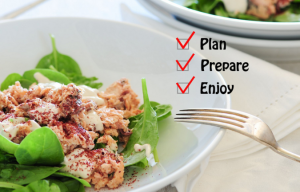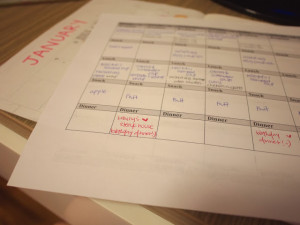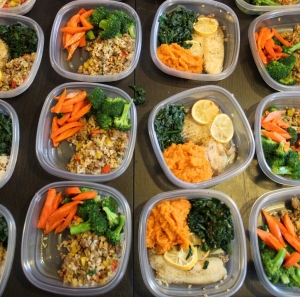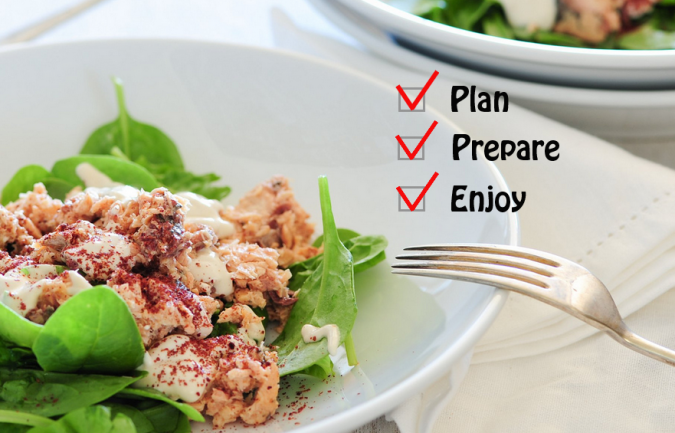 A healthy diet does wonders for our mind and body.
A healthy diet does wonders for our mind and body.
It should be simple, right? All you need to do is eat some vegetables and fruit, maybe throw in some greens and voilà, you’re a healthy human being. Not quite. The problem typically comes from our tendency to deviate from our healthy diets and downward spiral into fast food oblivion. Oftentimes, our healthy weekly meal plans go by the wayside as the week progresses. This can happen for a number of reasons, but you shouldn’t quit because you’ve cheated or lost momentum. Your old habits of junk food and convenience food may not disappear immediately, but with some tenacity and clever planning you’ll be able to re-route your meals into the proper direction.
Here are some good tips to help you along the way:
 1. Plan, Plan, Plan.
1. Plan, Plan, Plan.
The most important step is the planning stage. First consider what the week ahead looks like. If you have a daily planner, you may want to consult it for any changes that may require special planning. Then choose a really basic food planner to write down the meals for the week. Or use your computer or an app to help you with this.
Some things to consider are special events like office lunch meetings and social events that you wouldn’t be having to plan meals for. If you know that you have a few meetings or parties during the week, having a planner can help you to plan for some lighter meals to compensate for the extra calories from the other meals out.
The meal planner not only helps to see how many meals you need to plan for, but also how much you need to pick up at the store. It will guide you in putting together your shopping list. It also helps to see what kind of nutrition you might be missing out on. Then insert the different elements into your meals in according to whatever you feel like eating and the nutrition you need or may be lacking. For example, the week before, you may have eaten a whole bag of spinach over the previous week so for the following week, try to incorporate another vegetable. It’s best to try to rotate your vegetables as much as possible to get a variety of nutrition from your choices. Most health and nutrition books will advise that you eat a rainbow every single day and the glossy pictures in their book are always some amazing concoction with 10 veggies or something. This can get way too expensive and a bit too complicated. It is much easier to try to get different veggies week by week rather than daily. Nutrition aside, planning also helps make sure that you stay on budget.
 Be Prepared
Be Prepared
Pick a day to do your grocery shopping/ meal prep. This is a basic principal that can make the week easier. Preparation can be on a Sunday, if it helps. Storing prepared meals in the freezer or simply chopping and storing vegetables can go a long way. You want to know what your week will be like (remember, there will always be weeks where meals don’t go to plan). If you’re able to predict the week, you can project your meals accordingly. While challenges will arise, each week you will gain more experience and will, as a result, improve your healthy meal planning.
 Keep It simple
Keep It simple
If you are trying to plan for a different gourmet meal at each meal you may find yourself burned out from cooking all the time. There is nothing wrong with making a meal and splitting it up to use a few days during the week. Or if you do need more variety, when you make one meal during the week make extra to freeze and rotate the different meals from previous weeks.
When putting together meals, stick to the basic principal of 50% vegetables, 25% protein and 25% starch or grain. this will make putting together meals a snap. Simply make up a couple cups of your grain ahead like brown rice, quinoa and scoop out 1/2 cup portions. Do likewise with the vegetables and protein source. Just make enough to put together a basic meal and freeze or refrigerate ahead.
Some Other Things To Consider…
 Don’t Guilt Yourself
Don’t Guilt Yourself
In many ways food has become the new sin the Western world, one that justifies self torment and lowers self esteem everyday.
If you wander away from your carefully prepared plan and you have that extra slice of chocolate cake, the glass of wine at the company party or the apple pie at the family holiday dinner and in the moment there is no mistake that you do enjoy it. Sometimes rich and fatty foods can be almost sinful for lack of a better word, but you feel absolutely terrible afterwards, and you really wish that you had not eaten the foods that you had.
The guilt for some can be overwhelming, but the question remains, are these feelings of guilt really helpful? The answer is a resounding no! In fact what we know of human behaviors is that the more you beat yourself up about eating something that you feel that you shouldn’t have the more likely you are to keep eating it! Interesting cycle, and one that has helped most of us stay locked in a constant and unsuccessful struggle to improve our eating habits.
Don’t be too hard on yourself if you occasionally stray from your plan. Making a unplanned change is, more than likely, inevitable. The idea is to ensure that you are consistently improving. Nobody goes from eating a bad diet to an amazing diet in one day.
 Eat Whole Foods and Stay Active
Eat Whole Foods and Stay Active
Eating whole, unprocessed foods and maintaining an active lifestyle are key components of accomplishing your healthy goals. Maintaining an active lifestyle (running, walking, cycling, martial arts, etc.) can enhance your well being even further. These two components are detrimental to maintaining a healthy life style and fostering good habits.
It may seem intimidating at first and it’s certainly not easy, but this kind of routine and lifestyle creates positive changes in your life. If you feel stuck, try tapping into a number of our available resources.
- Tips for putting together healthy menus
- Six Weeks to a Healthy Diet Course
- SMART START MENUS
- Walk Talk Series


